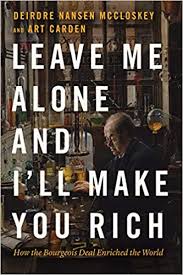Published on July 30, 2020 by Morgan Black

In this interview, Brock School of Business professor of economics Art Carden discusses Leave Me Alone and I’ll Make You Rich: How the Bourgeois Deal Enriched the World, for which he was the co-author.
In summary, the book is a refinement of economist and historian’s Deirdre Nansen McCloskey’s trilogy on the Bourgeois era. In this volume, McCloskey and Carden bring together her trilogy’s key points and arguments. It combines history, economics, literature, philosophy and pop culture and is the perfect introduction for a broad audience to McCloskey’s influential explanation of how we got rich.
The book is now available to purchase on Amazon.
available to purchase on Amazon.
 available to purchase on Amazon.
available to purchase on Amazon.How did you and McCloskey come to partner on this project?
We really started getting to know one another when my adviser (John V.C. Nye)
asked me to pick her up to and from the airport. She was at Washington University in Saint Louis to present a draft of The Bourgeois Virtues [the first volume of her Bourgeois trilogy], which I read in its entirety in the lead-up to her talk. I hosted her in 2009 when I was on the faculty at Rhodes College and remember spending a delightful afternoon browsing at bookstores in Oxford, Mississippi in advance of her seminar at the University of Mississippi during that trip. In October 2012, we met for lunch while I was in Chicago to film my parts of the “I, Pencil” Movie extended commentaries, a project she was also involved in. She asked me if I was interested in writing this book with her. It has been an honor to work with a scholar of McCloskey’s stature.
In summary, what exactly is the Bourgeois Deal?
The Bourgeois Deal (“leave me alone and I’ll make you rich”) stands in contrast to the Blue Blood Deal (“honor me, an aristocrat by birth, and do as I say, and maybe I won’t break you on the rack or slaughter you on the battlefield”), the Bismarckian Deal (“honor the modern state as your master and provider, and forsake the institutions of civil society that provide things like health care and social security, and you will at least not be exploited by the bourgeoisie or murdered by the Bolsheviks”), the Bolshevik Deal (“give you us according to your ability, which the Party determines, and consume only according to your need, which the Party also determines, and follow our five-year plans. Do not ask why the members of the party have caviar and vacation homes in the country while your children starve in an unheated hovel, and if you’re lucky we won’t have liquidated you in a gulag”), and the Bureaucratic Deal (“honor me, your lord and master by virtue of my advanced degree and follow the very detailed rules, which I write; take no risks that I don’t find acceptable, don’t even think about opening a business or trying something new without a license, which I give out; basically don’t do anything without getting my approval first, and maybe I won’t have fined and jailed you.”)
What are some of the reasons for global economic growth that you and McCloskey refer to as the Great Enrichment?
Embracing innovation and honoring, or at least tolerating, business. We recognized—which a lot of people still refuse to do—that exchanges are mutually beneficial.
When did we start to see a shift from poor to wealthy, and in what parts of the world?
Around the middle of the 18th century in Europe and its overseas extensions, following liberalization in China in the late 1970s.
What are some of the key ideas and arguments from McCloskey’s Bourgeois trilogy that you two felt important enough to support a new book?
The West grew rich—and now the world is growing rich—because we embraced innovation. Not just innovation, actually: innovation tested in markets against consumers’ willingness to pay with the fruit of their labor. We embraced a commercial society in which we adopted profits and losses as pretty reasonable indicators of whether we should do more or less of something. Revolutionize how people live, work and play by making pocket supercomputers? Profits say, “Do more of that.” Reformulate Coca-Cola? Losses say, “Do less of that.”
Importantly, we in the west did not get rich because of exploitation (slavery, imperialism, colonialism). These were net drags on industrializing economies.
Buying low, selling high, and coming up with new ideas is virtuous. Commercial societies are not zero-sum games where for every winner, there is a loser. People only agree to a deal if they both expect to be made better off.
Very importantly, the poor, not the rich, have been the biggest winners. As Joseph Schumpeter put it, electric lighting was no great boon to a king or queen who had a small army of people to keep an arsenal of candles lit. It’s revolutionary to people who can identify with these lines in Johnny Cash’s song “Pickin’ Time”--”It’s hard to see by the coal-oil light/and I turn it off pretty early at night/’cause a jug of coal oil costs a dime/but I stay up late come pickin’ time.” Indicators like life expectancy, income, health and just about everything else are improving rapidly even though the world’s population is growing. It’s not because of charity or foreign aid, either. Extreme poverty is falling like a stone around the world because more and more people are embracing the Bourgeois Deal and holding back—if only a little bit—when they are tempted to meddle in others’ affairs.
Who do you hope will be interested this book and what are some of the key things you hope the readers will take away from it?
Literally everyone. McCloskey and I argue that the Great Enrichment is literally the most important secular event in history. Never before have we seen sustained improvements in the lives of even the world’s poorest. We should be very optimistic about the 21st century and beyond. Our ancestors’ lives were solitary, poor, nasty, brutish and short, but if we keep our ethical wits about us—which might be hard to do in a pandemic—our descendants’ lives will continue to grow ever-more connected, wealthy, rich, peaceful and long.
Located in the Homewood suburb of Birmingham, Alabama, Samford is a leading Christian university offering undergraduate programs grounded in the liberal arts with an array of nationally recognized graduate and professional schools. Founded in 1841, Samford enrolls 6,324 students from 44 states, Puerto Rico and 16 countries in its 10 academic schools: arts, arts and sciences, business, divinity, education, health professions, law, nursing, pharmacy and public health. Samford is widely recognized as having one of the most beautiful campuses in America, featuring rolling hills, meticulously maintained grounds and Georgian-Colonial architecture. Samford fields 17 athletic teams that compete in the tradition-rich Southern Conference and boasts one of the highest scores in the nation for its 97% Graduation Success Rate among all NCAA Division I schools.


